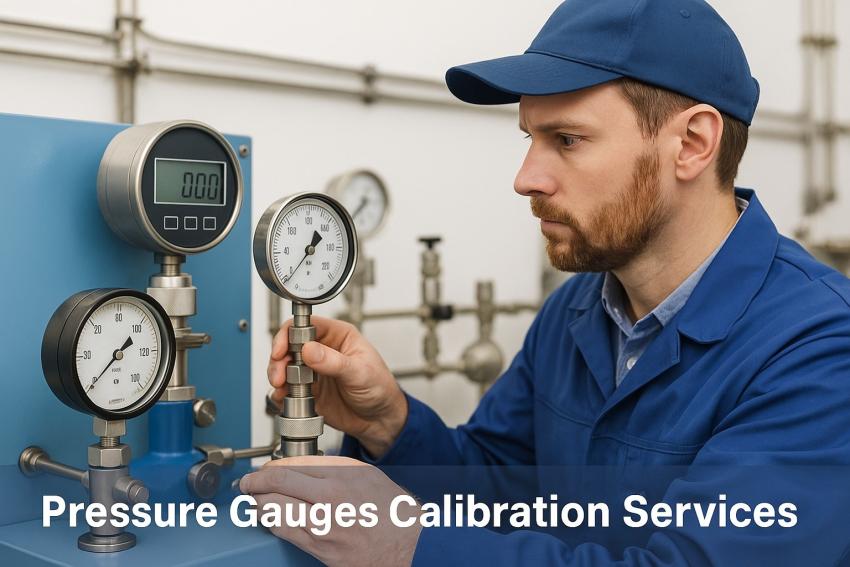
In today’s fast-paced industrial world, there’s no space for inaccuracy. Whether you’re in manufacturing, pharmaceuticals, oil & gas or HVAC systems, proper pressure measurement is key to safety, efficiency and compliance. That’s where Pressure Gauges Calibration Services come in.
Pressure gauges are everywhere whether it’s to measure air pressure in a pneumatic system or fluid level in a complex industrial machine. Gauges can lose their initial accuracy over time due to wear and tear, mechanical fatigue, environmental conditions or simply because of frequent use. Without control, even minor deviations can lead to costly downtime, unsafe working conditions or non-compliance with industry regulations.
So, how do you ensure your pressure gauges are reliable and compliant? Let’s find out through calibration.
The Importance of Calibration in Any Industry.
Calibration is the comparison of the measurement read by a pressure gauge against a recognized certified standard. This allows the technicians to identify any inaccuracies and make adjustments or repairs. When done regularly, calibration will ensure that the instruments are giving the right readings that are essential in:
- Meeting safety standards
- Ensuring consistency of operations
- Avoiding legal or regulatory problems
- Avoiding equipment damage or process malfunction
Industries have standards to maintain which are provided by ISO, ASME and ANSI organizations. Not being able to meet these standards because of inaccurate instrumentation can not only shut down operations but also result to huge fines or loss of image.
The Pressure Gauges Types That Need Calibration
There are numerous gauges that modern industries use to measure pressure. Each of the types has its particular functionality and calibration requirements. So, the most typical ones are:
1. Mechanical Pressure Gauges
They are the most conventional type and are common in industries. They work on mechanical components such as Bourdon tubes or diaphragms to measure pressure. Mechanical Pressure Gauges, though dependable, are vulnerable to wear and tear and environmental influences. Regular calibration is required to keep them giving the right reading over time.
2. Air Pressure Gauges
Air Pressure Gauges are commonly used in HVAC systems, compressors, and pneumatic tools, playing a crucial role in maintaining optimal performance and efficiency. Their accuracy may be influenced by dust, humidity, and temperature changes. Calibration assists in ensuring consistency in the pressure monitoring that is critical in air systems to prevent energy wastage or system breakdown.
3. Digital Pressure Gages
The modern industries prefer these gauges because they are easy to use and have a digital display. Digital Pressure Gages are supplied with electronic sensors and usually data logging and remote monitoring capability. Although they are more precise than mechanical ones, they also need to be calibrated in order to keep an accurate reading particularly following extended use or when subjected to severe conditions.
How Calibration Services Guarantee Compliance
Pressure Gauges Calibration Services is a systematic process of adjusting your gauges to match the certified national or international standards. A typical calibration process will entail the following:
- Inspection: The technicians visually inspect the gauge to check whether it is damaged, contaminated, or not installed properly.
- Testing: The gauge is tested against a traceable standard at a number of pressure points.
- Adjustment: In case the gauge proves to be out of tolerance, it is adjusted to restore it within the acceptable tolerances.
- Documentation: A calibration certificate is provided, which is frequently required during audits or to demonstrate compliance.
Numerous industries require working with a scheduled calibration and having detailed documentation is a benefit to demonstrate compliance during the quality audit or safety inspection.
Non-Compliance Benefits.
Although compliance with regulatory requirements is an important motivation, the benefits of regular calibration of your pressure gauges are numerous:
- Longer Equipment Life: Well-tuned tools put less stress on equipment and thus, minimize equipment failures.
- Process Optimization: Correct pressure measurements can be used to optimize flow rates, minimize energy consumption, and maximize yield.
- Cost Savings: Early detection of drift and correction can save the costs of repair, rework, or recall of products.
- Peace of Mind: You can rest assured that your process and safety systems are working as expected because your instruments are performing as expected.
Finding the Calibration Partner
Calibration services are not all the same. When selecting a service provider take into consideration:
- Accreditation: Is the laboratory ISO / IEC 17025 accredited?
- Traceability: Can the calibration be traced to national or international standards?
- Experience: Has the provider dealt with different kinds of pressure gauges and industrial necessities?
- Turnaround Time: Downtime is costly, select a service with a quick and solid turnaround.
Final Thoughts
Pressure gauge calibration isn’t just about meeting regulations, it’s a smart business decision. Pressure Gauges Calibration Services assist industries to exceed and meet standards, whether it is in workplace safety or operational efficiency.
Calibration schedules are the order of the day, whether you are using Mechanical Pressure Gauges, Air Pressure Gauges or Digital Pressure Gages, keeping up with these schedules will safeguard your operation, your team and your bottom line.
When you invest in the correct calibration services, you are not just compliant, you are investing in long-term success.




